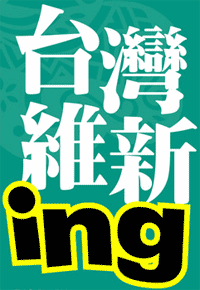 Putting English words in Mandarin sentences is of course extremely common in Taiwan and elsewhere in Asia, generally because this is thought to look cool and modern. But last month I was surprised to see Mandarin sentences with just English’s -ing added — and not one but two examples of this.
Putting English words in Mandarin sentences is of course extremely common in Taiwan and elsewhere in Asia, generally because this is thought to look cool and modern. But last month I was surprised to see Mandarin sentences with just English’s -ing added — and not one but two examples of this.
The image here is from a poster for the DPP’s presidential candidate, Frank Hsieh, that came out in March but which I didn’t see until a few days ago. It reads 台灣維新ing (“Táiwān wéixīn-ing“): “Taiwan is modernizing.” (Click the image to see the whole poster.)
The other example I noticed was in a newspaper headline about the Hong Kong pop diva Faye Wong: 明年拚老三 天后暫不復出 李亞鵬王菲 積極做人ING (Míngnián pīn lǎosān — tiān hòu zàn bù fùchū — Lǐ Yàpéng, Wáng Fěi jījí zuòrén-ing. “Next year work hard to produce third child — superstar temporarily not appearing — Li Yapeng and Faye Wong are energetically working on making a baby.”)
There are several other interesting things about the Faye Wong headline, such as the way in most other contexts zuòrén (lit. “be/make a person”) means something like “be a mensch.” But I don’t want to digress too much lest I never finish this post.
In both of these examples, -ing is used to emphasize the currentness of the actions. But it is of course possible in Mandarin to stress that something is going on now — and to do so without borrowing forms from English. For example, with zài:
- Lǐ Yàpéng, Wáng Fěi jījí zài zuòrén
- Táiwān zài wéixīn
Has anyone seen or heard other examples of this -ing grafting?
sources:
- 明年拚老三 天后暫不復出 李亞鵬王菲 積極做人ING, China Times, November 30, 2007
- “Táiwān wéixīn-ing” — Xiè Chángtíng quánguó xiàoyuán xúnhuí yǎnjiǎng (「台灣維新ing」謝長廷全國校園巡迴演講), Frank Hsieh’s blog, March 27, 2007
For lagniappe: lyrics to the Faye Wong song “Bù liú” in Pinyin, which has lots of examples of Mandarin’s bǎ.
